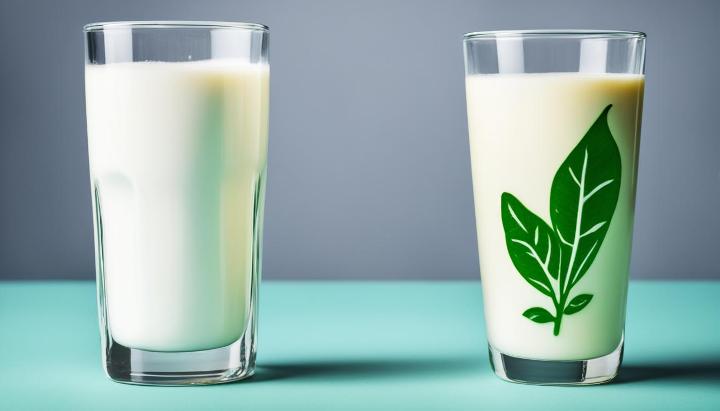Is Whey Protein Vegetarian? Find Out Here!
As a fitness enthusiast who follows a vegetarian diet, I often get asked if whey protein is compatible with my lifestyle. Whey protein is a popular supplement known for its muscle-building and weight loss benefits. But is it suitable for vegetarians? Let's delve into this topic and uncover the truth.

First and foremost, it's important to understand what whey protein is and how it is made. Whey protein is a derivative of milk and is produced during the cheese-making process. It is derived from whey, the liquid remaining after milk has been curdled and strained. This means that whey protein is ultimately derived from an animal source, which raises questions about its compatibility with vegetarian diets.
There are different types of vegetarian diets, ranging from lacto-vegetarian (including dairy) to strict vegan (excluding all animal products). The compatibility of whey protein with these diets varies. While lacto-vegetarians can consume whey protein, strict vegans may choose to avoid it due to its animal-derived nature.
Another aspect to consider is the role of rennet in cheese making. Rennet is an enzyme traditionally used to curdle milk and separate it into curds and whey. However, rennet is often sourced from the stomach lining of calves, making it non-vegetarian. Some cheese manufacturers now use microbial or vegetable-based rennet, which is suitable for vegetarians. However, it's essential to check the labeling or contact the manufacturer to ensure the rennet used is vegetarian-friendly.
So, is whey protein vegetarian? The answer depends on your specific dietary choices. If you follow a lacto-vegetarian diet and consume dairy products, including whey protein in your regimen shouldn't be an issue. However, if you follow a strict vegan diet, you may want to explore plant-based protein alternatives that align with your dietary preferences.
Key Takeaways:
Whey protein is derived from whey, the liquid remaining after milk has been curdled and strained during the cheese-making process.
It is ultimately derived from an animal source, which raises compatibility concerns for vegetarians.
Lacto-vegetarians can consume whey protein since they include dairy in their diet.
Strict vegans may choose to avoid whey protein due to its animal-derived nature.
Checking the labeling or contacting the manufacturer can help ensure the rennet used in cheese making is vegetarian-friendly.
Understanding Whey Protein and Vegetarianism
In this section, I will provide a detailed explanation of what whey protein is and how it is derived from milk. We will also discuss different types of vegetarian diets and their compatibility with whey protein. Additionally, we will explore the role of rennet in cheese making and the concerns it raises for vegetarians.
Defining Whey Protein: A Dairy Derivative
Whey protein is a high-quality protein derived from milk during the cheese-making process. It is extracted from whey, the liquid portion left behind after milk has been curdled and strained to form cheese. This liquid is then processed to remove the lactose, fats, and other non-protein components, resulting in a concentrated form of protein known as whey protein powder.
Vegetarian Diet Types and Whey Protein Compatibility
When it comes to vegetarianism, there are different dietary practices, including lacto-vegetarian, ovo-vegetarian, and vegan diets. Lacto-vegetarians consume dairy products but avoid meat, fish, poultry, and eggs. Ovo-vegetarians consume eggs but avoid meat, fish, poultry, and dairy products. Vegans exclude all animal products from their diet.
Whey protein is derived from milk, making it incompatible with a strict vegan diet. However, it can be suitable for lacto-vegetarians and ovo-vegetarians who include dairy or eggs in their diet. It is important for individuals following a vegetarian diet to read product labels and ensure that the whey protein they choose is suitable for their specific dietary preferences.
The Role of Rennet in Cheese Making and Vegetarian Concerns
Rennet is an enzyme commonly used in the cheese-making process to coagulate milk and separate it into curds and whey. While traditionally sourced from the stomach lining of young calves, vegetarian-friendly alternatives are now available. Vegetarian rennet, derived from microbial or plant sources, provides a suitable option for those who follow a vegetarian diet.
For vegetarians, the use of animal-based rennet in cheese-making poses concerns, as it is derived from the stomach lining of slaughtered animals. Therefore, vegetarians opting for cheese should look for products labeled as vegetarian or rennet-free, ensuring that the cheese is made using vegetarian-friendly alternatives.
In the next section, we will delve further into whether whey protein is suitable for vegetarians. We will explore vegetarian-friendly protein sources and the acceptance of dairy protein in lacto-vegetarian diets. Additionally, we will discuss vegetarian labeling and provide tips on finding suitable whey protein for vegetarians.
Is Whey Protein Vegetarian?
Deciphering Vegetarian-Friendly Protein Sources
While whey protein itself is derived from dairy, there are several vegetarian-friendly protein sources that can be incorporated into a vegetarian diet. These sources provide essential amino acids and can help meet the protein needs of vegetarians.
Some of the vegetarian-friendly protein sources include:
Plant-based protein powders (such as pea protein, hemp protein, and brown rice protein)
Lentils and legumes
Quinoa
Nuts and seeds
Soy products (such as tofu and tempeh)
These alternatives offer a variety of nutrient profiles and can be easily incorporated into meals and snacks.
Lacto-Vegetarian Diets and Dairy Protein Acceptance
In lacto-vegetarian diets, individuals consume dairy products but exclude meat, fish, poultry, and eggs. Whey protein, being a dairy protein, is generally accepted in lacto-vegetarian diets. It can provide a convenient and easily digestible source of protein for individuals following this dietary pattern.
However, it's important for lacto-vegetarians to consider the source and quality of whey protein they choose. Opting for organic and ethically sourced whey protein can align with lacto-vegetarian principles and ethical considerations.
Vegetarian Labeling and Finding Suitable Whey Protein
When searching for suitable whey protein as a vegetarian, it's essential to look for specific labeling and certifications. Some whey protein brands offer vegetarian labeling or certifications indicating that their products are suitable for vegetarians.
Here are a few key points to consider when identifying vegetarian-friendly whey protein:
Look for whey protein isolate or concentrate derived from vegetarian-friendly rennet sources.
Check for labels or certifications indicating that the product is vegetarian suitable or vegetarian-friendly.
Read the ingredients list to ensure there are no animal-derived additives or flavorings.
Hammer Nutrition Whey Protein Powder
By choosing whey protein that meets these criteria, vegetarians can enjoy the benefits of this high-quality protein supplement while staying true to their dietary preferences.
Conclusion
After exploring the vegetarian status of whey protein, it is clear that it can be a compatible supplement for vegetarians. Whey protein is derived from milk, making it a dairy product. However, it is important to note that not all vegetarians consume dairy products. For lacto-vegetarians who include dairy in their diet, whey protein can be a valuable source of protein.
Vegetarians who do not consume dairy products can still find suitable protein sources that align with their dietary choices. Plant-based protein powders, such as pea protein or soy protein, are popular alternatives for those following a vegan or strict vegetarian diet. These options provide a complete source of protein and can meet the nutritional needs of vegetarians without relying on dairy-based supplements like whey protein.
In conclusion, whey protein can be considered vegetarian-friendly, but its compatibility depends on the individual's dietary preferences. It is always essential to read product labels and look for vegetarian certifications to ensure that the whey protein you choose complies with your specific dietary needs. As with any dietary supplement, it is recommended to consult with a healthcare professional or registered dietitian for personalized advice based on your dietary goals and health requirements.
For further reading on this topic, you may find reputable vegan and vegetarian websites, nutrition books, or scientific journals helpful. These resources can provide more in-depth information on vegetarianism, protein supplementation, and suitable alternatives to whey protein that align with specific dietary preferences.








![[WC24] Whey Protein Powder (Chocolate)](/web/image/product.product/3855/image_256)
![[WP24] Whey Protein Powder (Unflavored)](/web/image/product.product/3859/image_256)
![[WS24] Whey Protein Powder (Strawberry)](/web/image/product.product/3857/image_256)
![[WV24] Whey Protein Powder (Vanilla)](/web/image/product.product/3853/image_256)